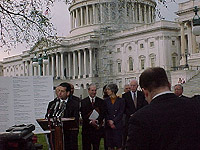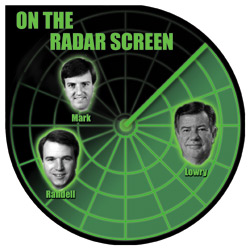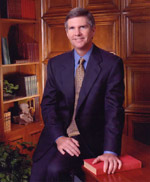 DOJ looking into radio business practices DOJ looking into radio business practices
There is a new sheriff in town and his name is the DOJ. RBR has learned that the Department of Justice is "reaching out" and talking with individuals and companies that have concerns about radio companies and sources say in particular the business practices of Clear Channel (CCU). These conversations are on going. Those talking with the DOJ's Antitrust Division include artists, promoters and radio companies. We hear folks are mailing in materials to Jim Wade Department of Justice Antitrust Division at 1401 H Street NW in Washington DC 20530.
RBR Observation:
Who would have thought a Republican administration would be looking into such matters. Must be very serious to warrant such a dialogue. As we now know the Senate will be looking into the allegations of potential antitrust issues with the just announced legislation by Senator Feingold "Competition in Radio and Concert Industries Act".
It's a battle of the titans:
Senator Feingold legislation unveiled
In one corner we have Senator Feingold (D-WI), AFTRA, NABOB, Consumer Union, Record Labels, Artists, along with some station owners, radio groups, concert promoters and concert venues vs. Clear Channel, NAB and other radio groups not yet publicly identified. The stakes could not be higher.
 From the bills title some assumed that the legislation was going to be focused strictly on Clear Channel. After all who owns a radio group and a concert venue business - just one - CCU. "This is not just about one company," stated Feingold." The Competition In Radio And Concert Industries Act will be looking into all aspects of radio consolidation. As he reminded RBR and the other press at his 6/27 news conference he was one of only 5 Senators that opposed the 1996 Telcom Act. What's his beef? Radio consolidation has gotten out of control and he is introducing legislation "trying to prevent further harm". From the bills title some assumed that the legislation was going to be focused strictly on Clear Channel. After all who owns a radio group and a concert venue business - just one - CCU. "This is not just about one company," stated Feingold." The Competition In Radio And Concert Industries Act will be looking into all aspects of radio consolidation. As he reminded RBR and the other press at his 6/27 news conference he was one of only 5 Senators that opposed the 1996 Telcom Act. What's his beef? Radio consolidation has gotten out of control and he is introducing legislation "trying to prevent further harm".
The bill does not try to unwind the Telcom Act but put in measures to put radio consolidation under tighter controls. The harshest penalties are for anti-competitive behavior. Feingold wants to "prohibit any entity that owns radio stations, concert promotion services, venues from acting in an anti-competitive manner." His bill wants "the Federal Communications Commission (FCC) to revoke the license of any radio station that uses its cross-ownership of promotion services or venues to discriminate against musicians, concert promoters, or other radio stations." Other key elements in the legislation included enhanced scrutiny of further consolidation, close the loophole on payola and require on air identification if music is paid to be played, have LMAed stations count under ownership cap rules if they get a significant amount of advertising or playlists from a partner and require the FCC oversight of Arbitron measurements to prevent potential manipulation.
 Press releases were flying soon after the legislation was announced. NAB President and CEO Eddie Fritts (pictured left) stated, "The 1996 Telecommunications Act has strengthened the ability of radio to better serve listeners, and we strongly dispute claims that radio has grown more homogenous in recent years" Mark Mays President and Chief Operating Officer of Clear Channel lead off his release with the fact that "Five major players who control 84 percent of all album sales, for example, now dominate the record business. And in the movie industry, the 10 largest studios account for almost 100 percent of the revenues." Press releases were flying soon after the legislation was announced. NAB President and CEO Eddie Fritts (pictured left) stated, "The 1996 Telecommunications Act has strengthened the ability of radio to better serve listeners, and we strongly dispute claims that radio has grown more homogenous in recent years" Mark Mays President and Chief Operating Officer of Clear Channel lead off his release with the fact that "Five major players who control 84 percent of all album sales, for example, now dominate the record business. And in the movie industry, the 10 largest studios account for almost 100 percent of the revenues."
Are you wondering how long Senator Feingold has been working this issue? Well we have some idea. We "sent a letter to the Attorney General in March and we have not had a response". Senator - see related story this page for your answer.
What's next? First will be attempts to get co-sponsors and bi-participian support. Broadcasters should expect hearings at a minimum and a committee vote before the year ends. Is this going to just go away - don't think so. "I'm committed to working for many, many years," said Feingold. We probably should take him at his word - after all the campaign finance reform bill took many years too.
 May Day, May Day May Day, May Day
Lowry now has a problem, along with Mark and Randall Mays. Sen. Russell Feingold (D-WI) addressed President Bush on the Senate floor and talked about introducing a bill to reform a number of industry practices. Feingold says the Telcom Act of '96 has lead to over-concentration of ownership and anti-competitive practices. Hot button points included "legal" payola, overpriced concert tickets and at the end of the day negative effects on consumers, artists and local businesses. The full speech is on our website www.rbr.com under "What's New" (see RBR daily email 6/14)
RBR Observation:
Don't think it is ever a good thing to have a Senator mention your company by name on the Senate floor. Just a hunch here, but they must have compiled some interesting info about Clear Channel. We can see a scenario developing where Congress writes into law that the airwaves are open to the public and no one can charge music artists a fee for access to them, which is essentially what is being done by the groups. Is it illegal now? Don't think so, as long as you don't violate the payola law, but they can make it so. Don't think the spin by Randy Michaels that they are just trying to be good Samaritans and clean up a dirty system will fly. Back in the day at Jacor, Randy would charge vendors money to have access to his PDs-this is just an extension of that policy.
 Lowry (pictured right) has said he welcomes the investigation and predicts it will lead to the end of the independent promoter business (RBR 6/10). Maybe, but Clear Channel is the big target, not the indies-and the record labels are trying to portray themselves as the victims of the system they created. They can do it because they have friends in high places and media-savvy recording artists to parade into those congressional hearings. And what Senator wouldn't like to promise his constituents lower ticket prices for concerts? Lowry (pictured right) has said he welcomes the investigation and predicts it will lead to the end of the independent promoter business (RBR 6/10). Maybe, but Clear Channel is the big target, not the indies-and the record labels are trying to portray themselves as the victims of the system they created. They can do it because they have friends in high places and media-savvy recording artists to parade into those congressional hearings. And what Senator wouldn't like to promise his constituents lower ticket prices for concerts?
Would an appearance by Randy Michaels draw attention away from Britney Spears? We're not sure Randy's costume world get ups of the '70's will get the same reaction under the lights of a Senate hearing. It would be great C-SPAN TV though. RBR will continue to follow the flight path of CCU and advise our readers.
Broadcasters want to slow down PPM
Concerned that Arbitron (N:ARB) is moving too fast, while many questions remain unanswered, an ad hoc committee of major radio groups is asking the ratings company to slow down its fast-track plan to implement the Personal People Meter (PPM).
RBR Observation:
We understand Arbitron's business reasons for trying to bring PPM along as quickly as possible-it's not making any money while it's in the testing phase. But, as Charlebois acknowledges, nothing is going to happen until it has customers signed on the dotted line. Nielsen is the big fish, but Arbitron also needs backing from the radio groups to go forward. For that matter, Nielsen will need backing from its TV and cable customers.
Some of the most important questions are on hold until the Nielsen deal is done. But at least broadcasters are going to be getting some better data to work with to assess how PPM compares to diaries. Although the initial data dump compared an April PPM snapshot to the Winter book's diaries, May data will be released next week (6/20), along with a software application to allow users to make any comparisons they wish side-by-side with diary data.
Talks with Nielsen have already dragged on a couple of quarters longer than Arbitron had planned, so we wouldn't want to put any money on PPM being implemented on a real-world basis in Philly anytime in 2003. It could happen, but Arbitron still has a lot of ducks to get into a row.
What has broadcasters worried about PPM? Check out their comments on page 2. You can also see more of Owen Charlebois' response in RBR's 6/20 Daily Email.
 The End of the Big Mac The End of the Big Mac
With Hispanic Broadcasting Corp. (N:HBC) CEO Mac Tichenor and family announcing the merger to Univision (N:UVN), the nation's largest Spanish TV company (6/12).
UVN is getting into radio-and in a big way with HBC lock, stock and enchilada for $3.5B in Univision stock-or $2.9B if you prefer to use the value of the deal after investors sold off Univision shares. The exchange rate is fixed-HBC shareholders are to receive 85% of a Univision share for each HBC share.
RBR observation:
Now the Big Mac will Super Size but NO regulatory impediments? What planet is Hobson living on? We agree that the Hispanic market place is the fastest growing growing at a 7X multiple to the tune of $3.5Billion annually.
Analysts tried repeatedly to get Hobson to explain how UVN is going to deal with its 32% stake in Entravision (N:EVC), which has numerous market overlaps (both radio and TV) with HBC. But all he would say is that there's nothing that can't be dealt with-and he likened Univision's stake in Entravision to Clear Channel's (N:CCU) 26% stake in HBC. (Clear Channel will wind up owning 7% of Univision and has agreed to vote for the merger. Hello Again-here is CCU and remember last week with Lowry talking about size (RBR Observation 6/10).
The problem is, Univision's stake in Entravision isn't like CCU's HBC stake at all. CCU's shares are non-voting-except that it gets to vote on the sale of the entire company, as in this case-and there are no management ties so that HBC's stations aren't attributable to CCU at the FCC.
But Univision's stake in Entravision is fully attributable-as regularly reported to the FCC by both companies. And Univision has two of its people on Entravision's Board of Directors. Hobson has to know that-he's one of them! The other is Michael Wortsman, Co-President of Univision Television.
Univision could try now to do what CCU did and create barriers to make its Entravision stake non-attributable. The problem there is the DOJ-even under a Republican administration. CCU and HBC set up their arrangement long before the DOJ took an interest in radio mergers. But when HBC wanted to buy some of the stations being spun off in the merger of CCU and AMFM, the DOJ said no-the companies were too closely related. And there was a distinct implication that the DOJ's antitrust watchdogs felt they'd dropped the ball years earlier by not opposing the CCU/HSP arrangement. Getting a similar deal approved now won't be easy-and you'd have to sell the story to both the FCC and the DOJ this time.
Finally putting the nation's largest Spanish radio group into an Hispanic-run company may blunt some of the Democrats' concerns on Capitol Hill about media consolidation, but there's no way Michael Powell & Co. are going to let a 14-station radio superduopoly slip by unnoticed in Dallas. (RBR highly recommends you listen to this conference call at RBR.COM A
Get Ready to Rumble:
SBS lawsuit sends CCU shares plunging
The Univision deal was the last straw. After years of having Spanish Broadcasting System (O:SBSA) cast as "the other Hispanic radio company," Raul Alarcon had apparently had all he could take when rival Hispanic Broadcasting Corp. (N:HSP) announced its $3.5B deal to be acquired by Univision (N:UVN). SBS had been working on an antitrust lawsuit against HBC and its part-owner, Clear Channel (N:CCU).
RBR observation:
This is definitely a steel-cage grudge match that won't be easily settled out of court. Alarcon has been frustrated for years at having to compete against both a larger Spanish radio company and the largest radio company of them all.
Do or Did CCU and HBC work in tandem against SBS? They deny it, but Alarcon is convinced that they do or does-and he believes he has evidence to prove it.
If the ultimate goal of CCU and HBC was to buy out SBS-as the lawsuit alleges-it appears they just didn't ever offer a big enough check. Like many other group owners, Alarcon has been talking to potential buyers off and on for years. We'd heard that he was close at one point to a deal to become part of Viacom (N:VIA), which has been shopping for a Hispanic media wing. But having HBC become an even more formidable competitor by teaming with Univision could make it even harder to get a premium price for SBS. Alarcon has a lot to gain if he can break up this deal. This is one fight after Lewis & Tyson that we would buy on Pay-Per-View! .
Lowry prepares for congressional colonoscopy
And is diagnosing a clean corporate bill of health surrounding Clear Channel (N:CCU). CEO Lowry Mays was writing prescriptions during the (6/3) Deutsche Bank Securities Media Conference and expects a clean bill of health. He narrowed his physical to the Congress taking interest in the radio, record and concert businesses.
RBR observation:
First, have you ever had a colonoscopy? The preparation the night before, well, been there...done that...Good Ol' Lowry says size makes CCU the target. But the old saying that it's not the size that counts but how you use it-well, in some ways the size is not the problem, it is how it is being used.
You wanna talk payola? The record labels created the indie tumor to get around the payola law. They fund it to this day. Go ahead laugh.You have the RIAA trying to write RX's to its members as victims of a quack dr. on the Hill. Don't sell them short! Record labels will march big-name artists up to these hearings-to dazzle and confuse the lawmakers. Remember which party controls the Senate and likes Hollywood parties and their money? Which maybe is another reason why Good Ol' Lowry has formed CCU's company-wide, not mandatory political contribution fund. Money talks.
As for payola, it has been around. I know because I was a PD in the '70's for ABC O&O KQV. But just go back to 1985 when indie promoters were the target of federal prosecutor Marvin Rudnick. Like Fred DiSipio and Joe Isgro. Read the book: "Stiffed, A True Story Of MCA, the Music Business, and the Mafia" by William Knoedelseder ('93). More on payola from RBR coming soon.
Radio as a business better get ready for one political fight. If you take any lesson from Good Ol' Lowry is he is one Texan that knows his way around Capitol Hill. He didn't spend the years on the NAB board and become its Chairman before deregulation for nothing.
|